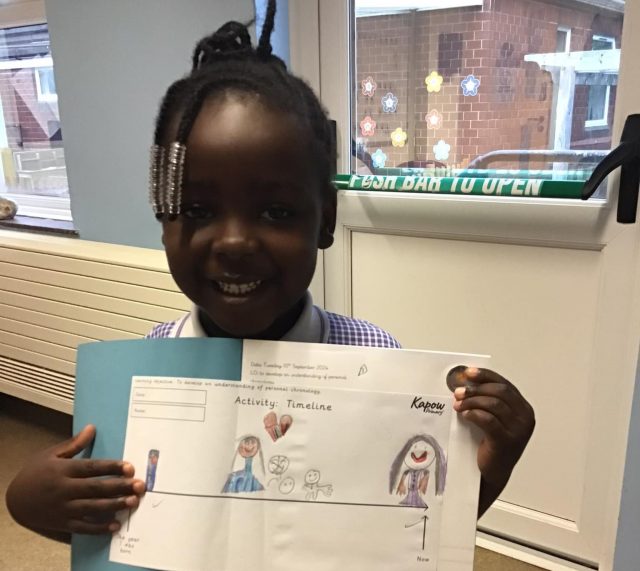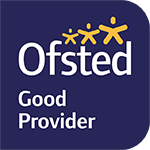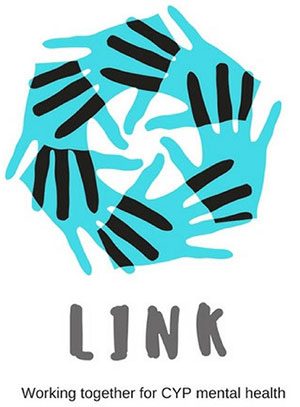English has an unparalleled place in education and in society; it’s at the heart of all learning and the key to future success. To become successful learners and thrive in later life, a high-quality education in English is crucial.
We strive to ensure that all pupils can speak, read and write fluently. Through reading in particular, pupils have the opportunity to develop culturally, emotionally, intellectually, socially and spiritually which will help them to become responsible citizens and participate fully as members of society.

At Moorlands, we believe that a high-quality English curriculum should develop our children’s love of reading, writing, speaking and listening. We have a rigorous and well-organised curriculum that provides many purposeful opportunities for each of these aspects of English. Our curriculum closely follows the aims of the 2014 National Curriculum for English, which is to enable all children to:
● read easily, fluently and with good understanding
● develop the habit of reading widely and often, for both pleasure and information
● acquire a wide vocabulary, an understanding of grammar and knowledge of linguistic conventions for reading, writing and spoken language
● appreciate our rich and varied literary heritage
● write clearly, accurately and coherently, adapting their language and style in and for a range of contexts, purposes and audiences
● use discussion in order to learn; they should be able to elaborate and explain clearly their understanding and ideas
● become competent in the art of speaking and listening, making formal presentations, demonstrating to others and participating in debate.
These aims are embedded across our English lessons and across the wider curriculum. We will provide the means for children to develop a secure knowledge-base in English, which follows a clear pathway of progression as they advance through the primary curriculum. Rigorous assessment and review will ensure that we are able to provide targeted support so that all children experience success in English; we believe that a secure basis in literacy skills is crucial to a high-quality education and will give our children the tools they need to participate fully as members of society.
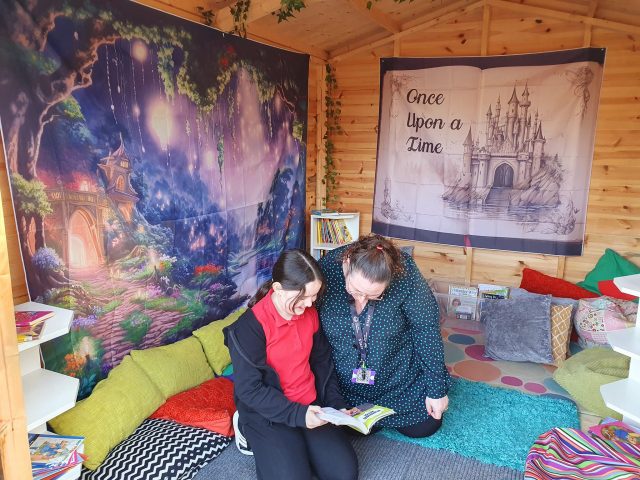
Reading
Early reading is taught through the Read Write Inc. programme. Regular training and development days ensure that staff are equipped to teach with the expertise and skills required to promote excellent progress, as well as a love of reading. Reading for Pleasure is absolutely central to the ethos of the school and is considered to be the bedrock of our approach to education. Each class’s timetable is organised to enable regular access to the school library, which has an up-to-date and diverse selection of books in order provide quality reading materials for all children. The pupils also take part in organising and developing their classroom reading environment and staff are supported in developing their knowledge of children’s literature. We work hard as a school to encourage a culture of ‘book talk’. Children are taught a wide range of strategies to improve their reading comprehension and to help them develop deeper reading skills through the use of VIPERS and by studying class texts (see Moorlands Reading Core). Reading aloud takes place regularly in each class to help promote a love of story and reading.
Writing
When planning English lessons, teachers make links to other areas of the curriculum to provide further context for learning where appropriate. Teaching blocks focus on fiction, non-fiction or poetry, in line with the 2014 National Curriculum, and reading comprehension, grammar, spelling and writing are embedded in lessons. We use Talk for Writing as our model for teaching writing. Lessons sequences themselves build progressively towards extended pieces of writing. Handwriting and spelling, based around Spelling Shed, are taught within English lessons when possible. We use Grammarsaurus to support our teaching of spelling, grammar and punctuation. Writing outcomes across the school are recorded in English books to promote a high level of pride and presentation across all written work.
To enrich and further develop the English curriculum, the school takes part in a wide range of initiatives, including judging book and poetry awards and supporting the Summer Reading Challenge. Children also take part in poetry and creative writing competitions and performances, which are regularly celebrated in whole school assemblies. Assessment is embedded in English lessons and children are active in reviewing the successes in their work and identifying, with support from their teacher, target areas for development to ensure a continuous and individualised approach to improving their work.
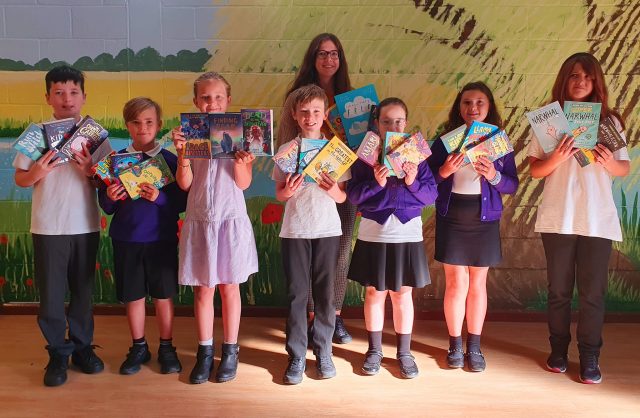
Our school English curriculum has evolved over several years. It is based around the National Curriculum but also around what we feel our children need to become effective communicators.
Early Years
- Demonstrate understanding of what has been read to them by retelling stories and narratives using their own words and recently introduced vocabulary;
- Anticipate – where appropriate – key events in stories;
- Use and understand recently introduced vocabulary during discussions about stories, non-fiction, rhymes and poems and during role-play.
Through the delivery of a knowledge-rich curriculum children in EYFS build a focused and sequenced body of learning which students are able to remember. Story is at the heart of our curriculum as it is essential children develop a life-long love of reading and it acts as a ‘gateway’ into all other areas of learning. They explore a range of high quality texts including fiction, non-fiction, poetry and wordless books. The children learn about story structure, characters and settings, they map stories and by using a Talk for Writing approach use actions to retell them. Non-fiction texts are used to investigate and discover information, whilst the children learn to write in various styles i.e. postcards, instructions and stories.
By the time children leave Reception they will be expected to:
Phonics
Children start their phonics journey in our Nursery where they explore: environmental sounds; instrumental sounds; rhythm and rhyme; body percussion; voice sounds; alliteration; oral blending and segmenting; before beginning the Read Write Inc phonics programme.
In Reception the children follow the Read Write Inc phonics programme which allows us to deliver a robust phonics curriculum to the children. Phonics begins on day one in Reception with a recap of Phase 1 phonics, which focuses on identifying the sounds children hear. They then move on to Phases 2, 3 and 4, spending time building skills such as phoneme and grapheme recognition, word blending and word segmenting. They apply their phonics knowledge on a daily basis, both in their adult-led work and their play. By the time children leave Reception they will be expected to:
Reading
Read a Green RWI book fluently using blending and with good comprehension
Read all Set 1 and first six Set 2 RWI sounds, and read the red words found in Green RWI books
Have a love for reading and books
Writing
Hold a pencil and form all letters correctly
Understand where to start writing on a page
Use Set 1 and first six Set 2 RWI sounds to write three and four letter words
Begin to write short sentences phonetically, leaving a space between each word
Key Stage 1
Children continue their phonics journey throughout Key Stage 1, until they know and can apply all Set 1, 2 and 3 sounds in order to read Read Write Inc grey books accurately, fluently and with good comprehension. The expectation is that most children will achieve this by the end of the autumn term in Year 2. Children who require extra support in order to achieve this receive rigorous 1:1 Read Write Inc fast-track tutoring.
Key Stage 2
Any children in Key Stage 2 who still require phonics support receive this via Read Write Inc fast-track tutoring and Fresh Start phonics interventions.
Please see our end of phase expectations for further information.
Key Documents:
The organisation of the English curriculum has created a community of enthusiastic readers and writers who enjoy showcasing their developing literacy knowledge and skills. Children are confident to take risks in their reading and writing, and love to discuss and share their ideas. Outcomes of work in both English and topic books evidence the high quality of work and the impact of varied and cross-curricular writing opportunities. These opportunities enable children to write across a range of forms and adapt their writing successfully, always considering its context, purpose and audience.
Reading
Pupils’ progress through phonics is assessed regularly using the Read Write Inc assessments. Pupils are then taught in groups which are matched closely to their current attainment. At the end of Year 1, pupils are assessed using the National Phonics Screening Check. Over the past three years, at least 90% of our pupils have passed.
In addition, PiXL reading assessments are used at regular times throughout the year to track and analyse progress in all year groups for reading. These assessments are used to populate question level analysis grids which allow teachers to analyse results forensically to inform planning for the cohort as a whole and for individual groups of pupils. These PiXL tests are also standardised so that results can be compared to other schools nationally.
Writing
Pupils’ writing is continually monitored and assessed against the National Curriculum and tracked using the PiXL writing descriptors. Internal moderation activities take place regularly, enabling teachers to compare their own judgments to either confirm or adjust them. External moderation meetings are attended regularly by teaching staff from all year levels.
